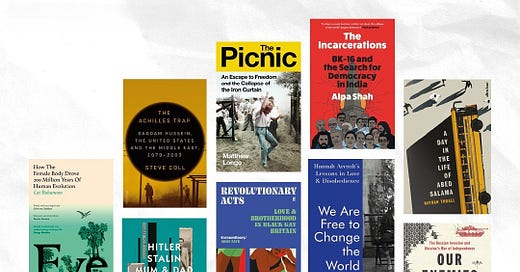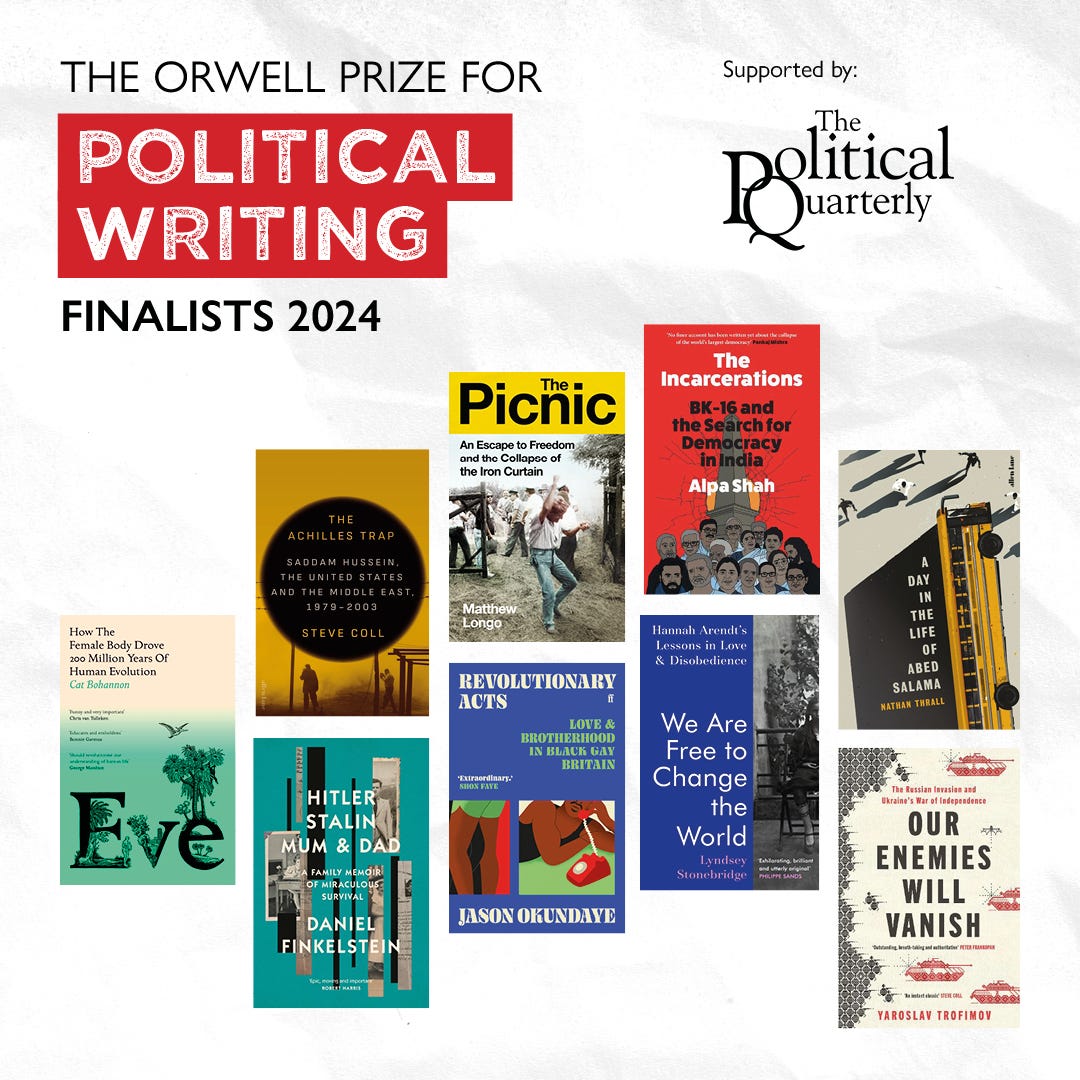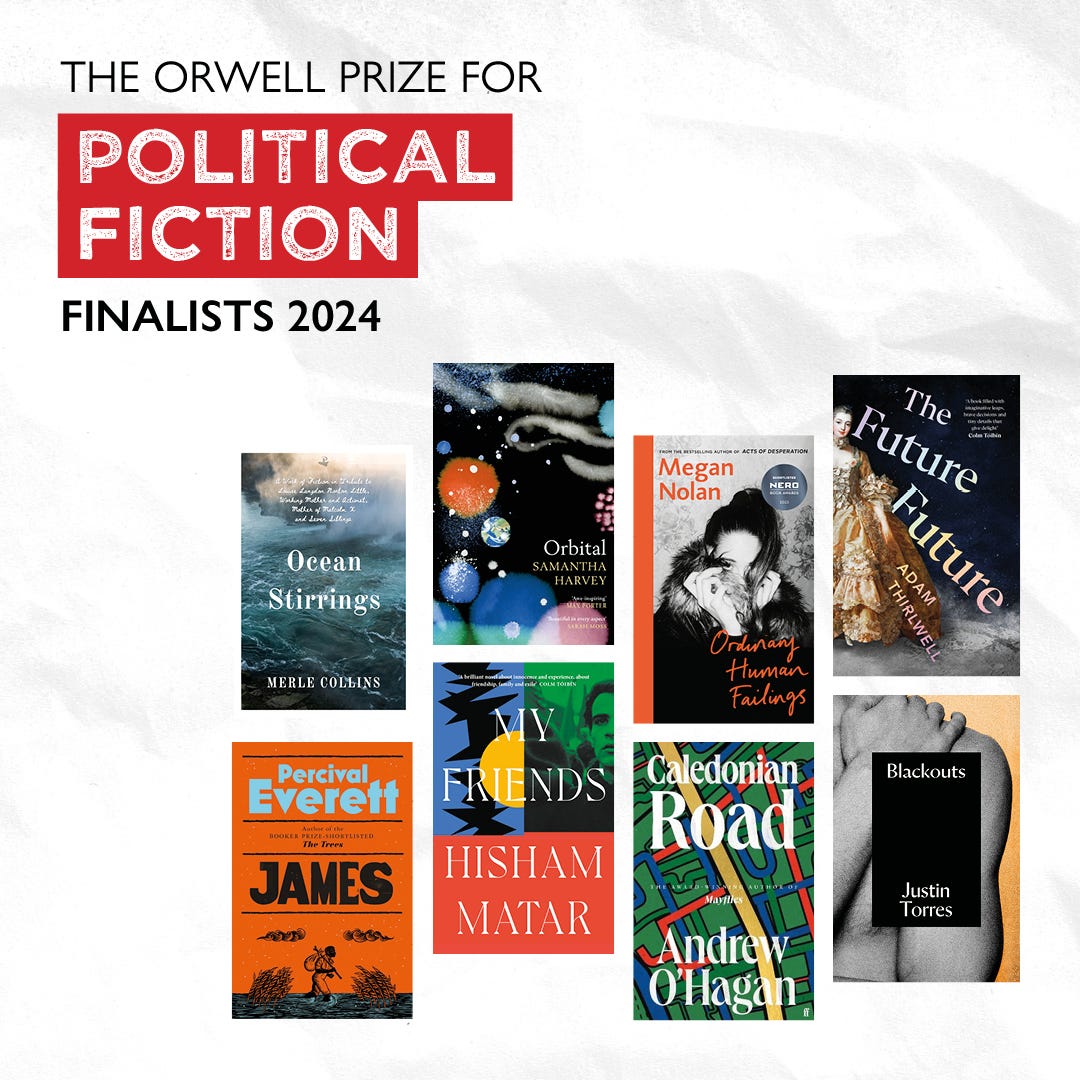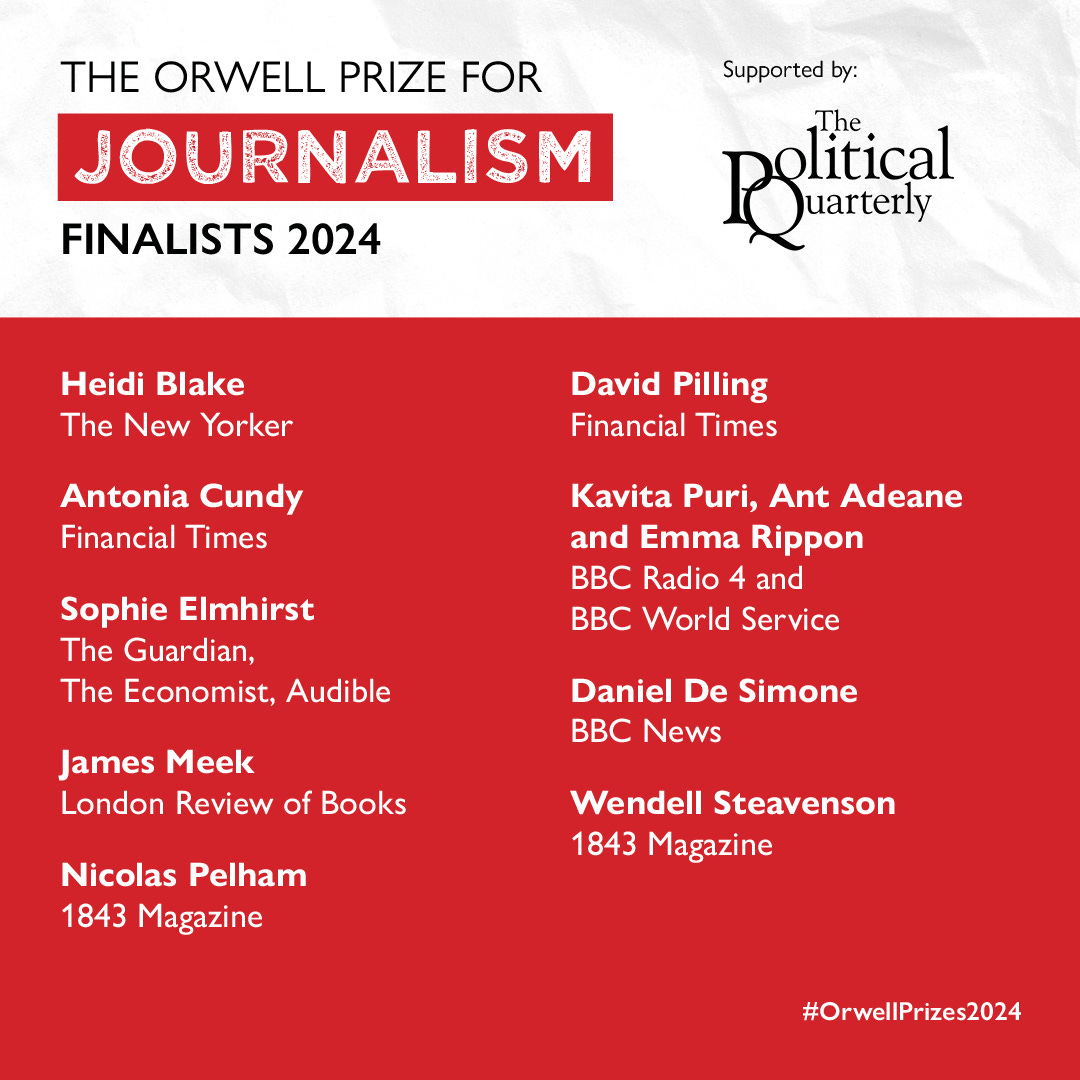The Orwell Prizes 2024: Finalists
Winners in four categories announced 27th June 2024
What I have most wanted to do... is to make political writing into an art.
George Orwell
This Saturday we were delighted to announce the finalists for the 2024 Orwell Prizes at a special event at the Charleston Festival, West Sussex. The winners in each category - Political Writing, Political Fiction, Journalism and Reporting Homelessness - will be announced at the Prize Ceremony in central London on 27th June 2024. In the meantime, stay tuned: we’ll be bringing you interviews with all the authors nominated for the awards right here on Substack.
The Orwell Prizes aim to encourage good writing and thinking about politics. The winning entries should strive to meet Orwell’s own ambition ‘to make political writing into an art’. They should be of equal excellence in style and content – the writing must be both political and artful. Judges are appointed by The Orwell Foundation each year, with a separate panel for each prize.
Scroll down to find out more about the books, journalism and reporting nominated for this year's awards, or head to The Orwell Festival (London, 12-27 June 2024) to book a place at one of this year's Orwell Prize readings and browse our other exciting events.
Friends of The Orwell Foundation receive exclusive benefits, including a copy of The Orwell Prize Anthology 2024 and two free tickets to selected events.
The Orwell Prize for Political Writing
Peter Frankopan, Chair of Judges, said:
Many of the books we have chosen for the shortlist are sure to become modern classics: books that will not just be read this year, but long into the future. All represent cases of outstanding writing; but they also speak to the importance of expert insights, the value of perspective and the power of political commentary. It will not be easy to choose a winner.
Eve by Cat Bohannon (Hutchinson Heinemann)
The Achilles Trap by Steve Coll (Allen Lane)
Hitler, Stalin, Mum and Dad by Daniel Finkelstein (William Collins)
The Picnic by Matthew Longo (Bodley Head)
Revolutionary Acts by Jason Okundaye (Faber)
The Incarcerations by Alpa Shah (William Collins)
We Are Free to Change the World by Lyndsey Stonebridge (Jonathan Cape)
A Day in the Life of Abed Salama by Nathan Thrall (Allen Lane)
Our Enemies will Vanish by Yaroslav Trofimov (Michael Joseph)
This year’s judges were: Peter Frankopan (Chair), Sunder Katwala, Christina Lamb, Lola Seaton and Rohan Silva.
The Orwell Prize for Political Fiction
Alexandra Harris, Chair of Judges, said:
We’re delighted to present a shortlist that affirms the enormous vitality and variety of political fiction. These books grapple with histories that are always contemporary. They offer magnifying glasses and telescopes. They renew our sense of how radical an act it can be to tell a story, to read a book, or still more to share what we have read – with strangers and with lovers. Every work here is testament to the power of blazing imagination and patient craft in our complex times.
Ocean Stirrings by Merle Collins (Peepal Tree Press)
James by Percival Everett (Mantle)
Orbital by Samantha Harvey (Jonathan Cape)
My Friends by Hisham Matar (Viking)
Ordinary Human Failings by Megan Nolan (Jonathan Cape)
Caledonian Road by Andrew O'Hagan (Faber)
The Future Future by Adam Thirlwell (Jonathan Cape)
Blackouts by Justin Torres (Granta)
Joining Alexandra Harris (Chair) on this year’s panel were Lara Choksey, Simon Okotie and Ross Raisin.
The Orwell Prize for Journalism
Janine Gibson, Chair of Judges, said:
The strength and determination of the writers and broadcasters who entered their work this year shows that journalists who pursue the truth are as dogged and committed as Orwell might have wished. We could have filled this shortlist twice over with as varied and compelling a list again, but we are proud to shine the spotlight on these extraordinary writers tackling important subjects with style, precision and urgency.
Heidi Blake, The New Yorker
Antonia Cundy, Financial Times
Sophie Elmhirst, The Guardian, The Economist, Audible
James Meek, London Review of Books
Nicolas Pelham, 1843 Magazine
David Pilling, Financial Times
Kavita Puri with Ant Adeane & Emma Rippon, BBC R4/BBC World Service
Daniel De Simone, BBC News
Wendell Steavenson, 1843 Magazine
This year’s judges were: Janine Gibson (Chair), Yuen Chen, David Gauke,
and Nazanin Zaghari-Ratcliffe.The Orwell Prize for Reporting Homelessness
Paddy O'Connell, Chair of Judges said:
This is Britain. As entrants, you collectively took us onto the streets and into precarious, temporary and often substandard accommodation. Our eight finalists all artfully and expertly brought human stories to bear on the wider picture - congratulations to every one of them. And to everyone who entered, thank you. We as judges have read and taken on board each piece: everyone has been seen. Now, it’s up to us to make sure you are heard.
Holly Bancroft, The Independent
Daniel Hewitt with Imogen Barrrer and Mariah Cooper, ITV News
Hannah Silva, A Single Parent Flat Hunting on Universal Credit
Vicky Spratt, The i Paper
Liam Thorp, Liverpool Echo
David Tovey, Arts and Homeless International
Kwajo Tweneboa, The Daily Mirror and Instagram
The Orwell Prize for Reporting Homelessness was launched in 2023 in partnership with the Centre for Homelessness Impact. The prize celebrates the art of evidence-led storytelling, accurate investigation, and innovative policy reporting, amplifies the voices of people with lived-experience and rewards the range of reporting, to explore homelessness in all its forms.
The judges this year were Paddy O’Connell (Chair), Sabrina Cohen-Hatton, Freya Marshall Payne and Lemn Sissay.
Join some of the finalists in this year's Orwell Prizes for our annual celebration of the most imaginative, important and honest writing and reporting. Highlights include Orwell Prize shortlist readings, a special evening celebrating Orwell's birthday with authors Ariane Bankes (The Quality of Love) and D. J. Taylor (Orwell: The New Life) and the return of our popular walking tours.
The Festival opens on 12th June with this year’s The Political Quarterly Conversation at University College London. As the UK general election approaches, Stephanie Flanders and Professor Michael Jacobs will be asking: what can the next government do about the economy?
Through our prizes, public events and work with young people, The Orwell Foundation supports and nurtures the writers and reporters who share Orwell’s values of bravery, integrity and fidelity to truth - both those working today and in the next generation.
As a registered charity, the Foundation relies on individual supporters and volunteers to sustain our work. By becoming a Friend, you can help us introduce more young people to the power of creative and critical writing - and access exclusive benefits, including two free tickets to Foundation events.










I should have won